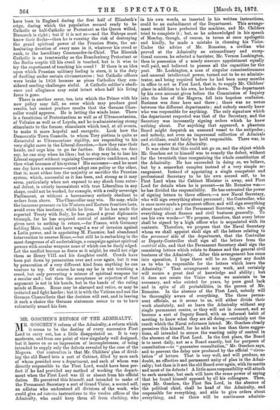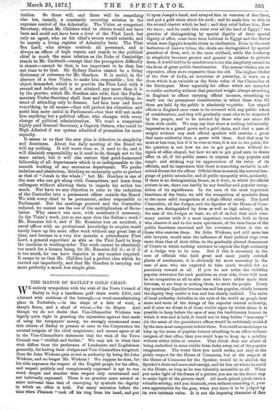MR. GOSCHEN'S REFORM OF THE ADMIRALTY.
MR. GOSCHEN'S reform of the Admiralty, a reform which it seems to be the destiny of every successive First Lord to carry out, has a little disappointed us. It is very moderate, and from one point of view singularly well designed, but it leaves on us an impression of incompleteness, of being intended to supply only the defects revealed by the case of the .Megrera. Our contention is that Mr. Childers' plan of divid- ing the old Board into a sort of Cabinet, filled by men each of whom presided over a department, and each of whom was directly responsible to the First Lord, would have been per- fect if he had provided any method of working the depart- ment when the First Lord was ill or absent from his official duties. He perceived this himself, and intended to make of the Permanent Secretary a sort of Grand Vizier, a second self, an adlatns who understood all divisions of the work, who Could give ad interim instructions to the twelve offices of the Admiralty, who could keep them all from clashing, who
in his own words, as inserted in his written instructions, could be an embodiment of the Department. This arrange- ment would have perfected the machine, and Mr. Childers tried to complete it ; but, as he acknowledged in his speech of Monday, though, of course, in terms at once apologetic and kindly, he made a mistake in choosing his Vizier. Under the advice of Mr. Romaine, a civilian who proved at the Admiralty an extraordinary and excep- tional success, he selected a barrister, Mr. Vernon Lushington, then in possession of a nearly sinecure appointment equally well paid, and believed to possess all the capacities for the post. Mr. Lushington, a man of singular conscientiousness and unusual intellectual power, turned out to be no adminis- trator, and being required before he had been many months in office to act as First Lord, that is, to supply Mr. Childers' place in addition to his own, he broke down. The department by. his own account given before the Commission of Inquiry into the loss of the Megmra, fell into hopeless confusion. Business was done here and there ; there was no nexus between the different departments ; and nobody exactly knew who was responsible for anything. The only signature which the department respected was that of the Secretary, and the Secretary was incessantly signing orders which he knew nothing about. For anything that appeared, a phantom Board might despatch an unsound vessel to the antipodes ; and nobody, not even an impersonal collection of Admirals and civilians, could fairly be held responsible. There was, in fact, no master at the Admiralty.
It was clear that this could not go on, and the object which Mr. Goschen set to himself was to remedy the defect, without for the twentieth time reorganizing the whole constitution of the Admiralty. He has succeeded in doing so, we believe, but by a somewhat complex instead of a very simple ar- rangement. Instead of appointing a single competent and professional Secretary to be his own second self, to be First Lord when the Cabinet Minister is away, and First Lord for details when he is present—as Mr. Romaine was— he has divided the responsibility. He has entrusted the power of signing letters to three officers,—a new Naval Secretary, who will sign everything about personnel ; the Controller, who is once more made a permanent officer, and will sign everything about materiel ; and the Permanent Secretary, who will sign everything about finance and civil business generally. To use his own words—" We propose, therefore, that every letter shall be signed by a high officer who is acquainted with its contents. Therefore, we propose that the Naval Secretary whom we shall appoint shall sign all the letters relating to the personnel side of the department, that the Controller or Deputy-Controller shall sign all the letters from the materiel side, and that the Permanent Secretary shall sign the remaining letters which relate to finance and the general civil business of the Admiralty. After this arrangement has come into operation, I hope there will be no longer any doubt as to who is responsible for the letters which leave the Admiralty." That arrangement may work, " and certainly will secure a great deal of knowledge and ability ; but it does not create the Vizier whom we maintain to be necessary, and who existed for years, by pure good luck and in spite of all probabilities, in the person of Mr. Romaine. In the absence of the First Lord, nobody will be thoroughly aware of everything. The three perma- nent officials, as it seems to us, will either divide their work absolutely, and so leave the Admiralty without any single permanent centre, or they will act in concert, and so become a sort of Deputy Board, with an informal habit of meeting to know what they are all doing,—certainly not the result which the Naval reformers intend. Mr. Goschen clearly perceives this himself, for he adds no leas than three sugges- tions, all intended to secure the wanting unity of control in the absence of the First Lord. In the first place, the Board is to meet daily, not as a Board exactly, but for purposes of consultation—to "guarantee consultation," Mr. Goschen says, and to prevent the delay now produced by the official " circu- lation " of letters. That is very well, and will produce, no doubt, an effective and permanent unity of plan in the Admi- ralty; but then is it not the old Board over again, with its merits and most of its defects? A little more responsibility will attach to each Member, but each will have the same power of saying that he found himself opposed by all his colleagues. Then, says Mr. Goschen, the First Sea Lord, in the absence of the political chief, shall be head of the Admiralty, and responsible for everything, and able to give orders about everything, and so there will be continuous adminia-
tration. So there will, and there will be something else too, namely, a constantly recurring scission in the supreme control of the Admiralty. The Vizier, or competent Secretary, whom Mr. Childers tried to obtain would not have been and could not have been a rival of the First Lord, but only an agent, who on his chief's return would subside, and be merely a living register of Admiralty facts. The First Sea Lord, who always controls all personnel, and is always an officer of high repute, and stands to the political chief in much the same relation as the Duke of Cambridge stands to Mr. Cardwell—except that the prerogative difficulty is absent—cannot be that, is too important to be that, has not time to be that. Sir Sydney Dacres cannot be a living dictionary of reference for Mr. Goschen. It is useful, in the absence of a true Vizier, to make him responsible ; but the object demanded, which is to provide the First Lord with a second and inferior self, is not attained, any more than it is by the proviso, which Mr. Goachen also adds, that the Parlia- mentary Under-Secretary shall hear and know everything, in- stead of attending only to finance. Let him hear and know everything, by all means—that will perfect his education, and make him more useful in Parliament—but that will not make him anything but a political officer, who changes with every change of political administration. We want a competent highly paid General Secretary, a Captain Osborn, who could be High Admiral if our system admitted of promotion for mere capacity.
It seems to us that the new plan is defective in simplicity and directness. About the daily meeting of the Board we will say nothing. It will waste time as it used to do, and it will diminish responsibility as it used to do, though not to the same extent, but it will also restore that good-humoured fellowship of all departments which is so indispensable to the smooth working of any enormous department. We prefer isolation and absolutism, thinking no unanimity quite so perfect as that of "Jonah in the whale ;" but Mr. Goschen is one of the men who can get along with Committees, and learn from colleagues without allowing them to impede his action too much. Nor have we any objection to raise to the reduction of the Controller into a permanent officer outside the Board. We wish every chief to be permanent, unless responsible to Parliament. But the meetings granted and the Controller reduced, we cannot see the use of the multiplication of Secre- taries. Why cannot one man, with assistants if necessary, do the Vizier's work, just as one man does the Sultan's work ? Mr. Romaine did it, and if Mr. Romaine was an accident, a naval officer with no professional knowledge to acquire could surely learn up the mere office work without any great loss of time, and become in a very few months a subordinate First Lord, a general supervisor as able as the First Lord to keep the machine in working order. The work cannot be absolutely too much for a human being, for Mr. Romaine did it ; or if it is too much, he can have deputies in any number required. It seems to us that Mr. Childers had a perfect idea which he carried out imperfectly, and that Mr. Goschen is carrying out more perfectly a much less simple plan.



































 Previous page
Previous page